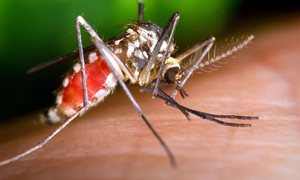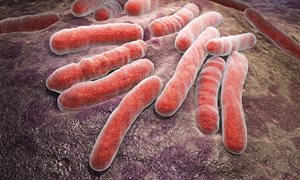
Disease and health are the result of a complex interaction between humans and their pathogens. Genetic factors that partly determine host defenses sometimes differ significantly between people and populations. This is shown in a paper in the American Journal of Human Genetics by researchers from the Netherlands, Tanzania and India. More genetic and immunological research in non-European populations will provide a better and more complete picture of how the human immune system works.
You never become ill on your own. It always involves a combination of host and guest, the human being infected by a virus, for example. The course of such an infection can vary greatly. One person may become seriously ill from a flu virus, while another may hardly notice it at all. How does that work exactly? What makes someone clear up a viral infection without a problem while someone else gets seriously ill? To a large extent, the explanation lies in our immune system, which can vary enormously from one individual to another. But there can also be clear differences in the immune system between different population groups.
Immune response regulators
To gain more insight into these differences, Collins Boahen from Radboudumc and his colleagues focused their research on the role of genetic factors in regulating cytokine production. Cytokines are an important and early link in the coordination of immune response. Like directors, they determine the immune system's response to invading pathogens. Cytokines are grouped into different factors, including interferons, interleukins, chemokines and tumor necrosis factors. All these different factors make the cytokine response a complex one, which can also vary greatly from person to person and from population to population. "Variations in the cytokine response determine not only the risk of infectious disease," says Boahen, "but also, for example, susceptibility to inflammation and autoimmune disease."
Tanzania
Cytokine responses in the Western European population (Caucasian race) have been studied many times. What is particularly lacking are data on cytokine responses in populations from other geographical areas. Together with Blandina T Mmbaga, director of the Kilimanjaro Clinical Research Institute in Tanzania, and her colleagues Godfrey Temba and Vesla Kullaya, Boahen investigated how these responses occur in healthy Tanzanian adults of East African descent. "In doing so, we also looked at the underlying genetic variations that may influence cytokine responses," says Mmbaga. "In other words, are there genetic differences between populations that cause some to respond differently to infection than others?"
Genetic and immunological differences
The research fits within the Human Functional Genomics Project (HFGP), which investigates how genetic variation in human DNA affects physiological processes, with a special focus on the immune system in health and human disease. Boahen: "The research shows that both genetically and immunologically, there are clear differences between the European and African populations. Genetically, for example, we see small variations - called SNPs - between the two groups that affect the production of cytokines. Put more simply, we see significant differences in the genetic basis for cytokine production in people from Tanzania in East Africa and Western Europe."
More focus on non-European populations
The results of this study, published in the American Journal of Human Genetics (AJHG), point to the need for more research in non-European populations. This is the only way to gain a full understanding of the diversity of the human immune system. Vinod Kumar, last author of the article, therefore argues for the inclusion of underrepresented populations in genetic research to enable new discoveries about differences in health and disease both between
individuals and populations.
-
Paper in the American Journal of Human Genetics (AJHG): A functional genomics approach in Tanzanian population identifies distinct genetic regulators of cytokine production compared to European population - Collins K. Boahen, Godfrey S. Temba, Vesla I. Kullaya, Vasiliki Matzaraki, Leo A.B Joosten, Gibson Kibiki, Blandina T Mmbaga, Andre van der Ven, Quirijn de Mast, Mihai G. Netea, Vinod Kumar
-
Want to know more about these subjects? Click on the buttons below for more news.
Related news items

Grants for research on magnesium deficiency and malaria Vidis for Felix Hol and Jeroen de Baaij
1 July 2022 Radboudumc researchers Jeroen de Baaij and Felix Hol both receive an NWO Vidi grant for their research, respectively on magnesium deficiency in type 2 diabetes and on malaria. go to page
Field research on malaria vaccine offers unexpected surprise
23 May 2022Field research on the effectiveness of a malaria vaccine, came up with unexpected results for an international group of researchers including Benjamin Mordmüller of Radboudumc. The vaccine evokes a broader response against malaria proteins than there are in the vaccine.
go to page
Rubicon grants awarded to three RIMLS researchers
19 April 2022Three researchers have received Rubicon funding from NWO/ZonMw. This will enable Elke Muntjewerff, Laura de Vries and Laurens van de Wiel to do research at a foreign research institute for the next two years.
go to page
Neolithic made us taller and more intelligent, but more prone to heart disease How modern European populations have evolved over the past 50,000 years
6 April 2022 After the Neolithic, European populations showed an increase in height and intelligence, reduced skin pigmentation and increased risk of cardiovascular disease due to genetic changes that lowered concentrations of 'good' HDL cholesterol. go to page
NIH grant for follow-up research on tuberculous meningitis
10 February 2022Met subsidie van het Amerikaanse NIH gaat With a grant from the U.S. NIH, Reinout van Crevel will continue to unravel the disease process of tuberculous meningitis.
go to page
